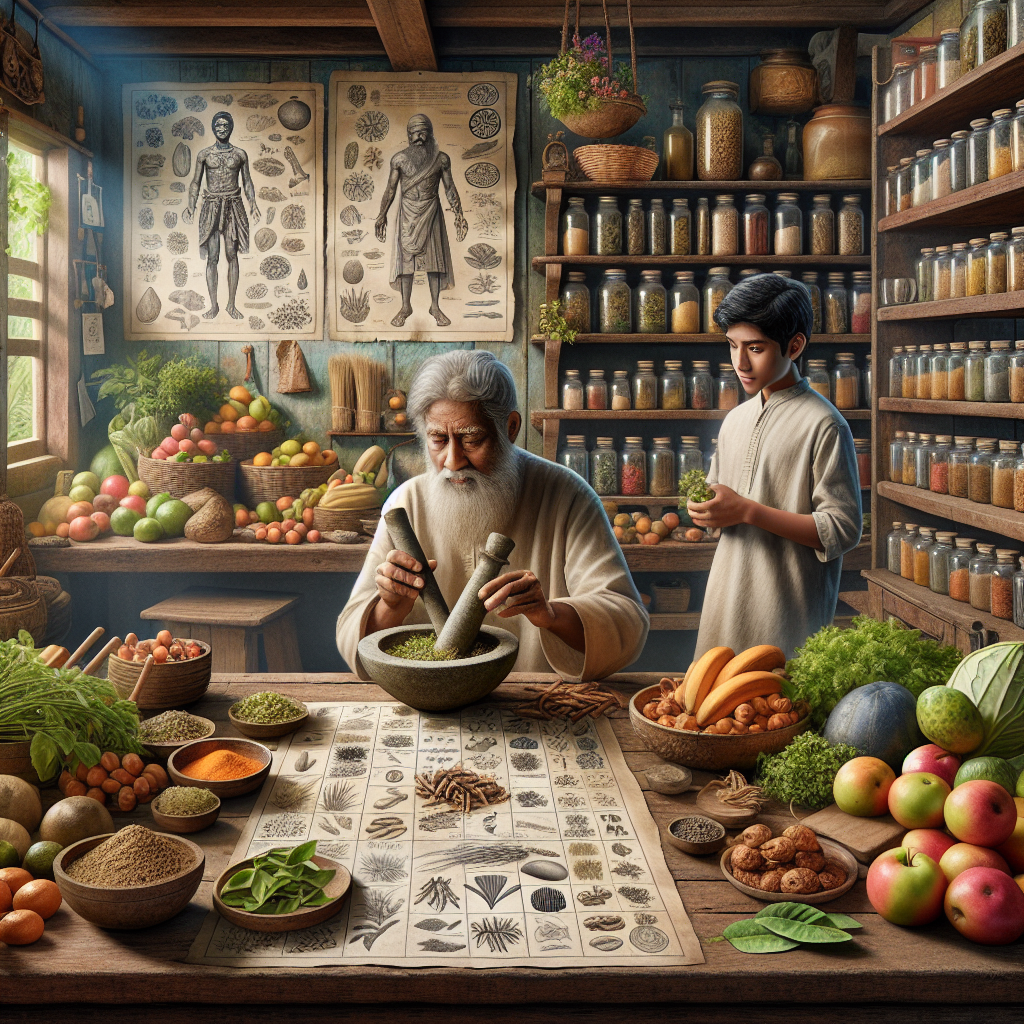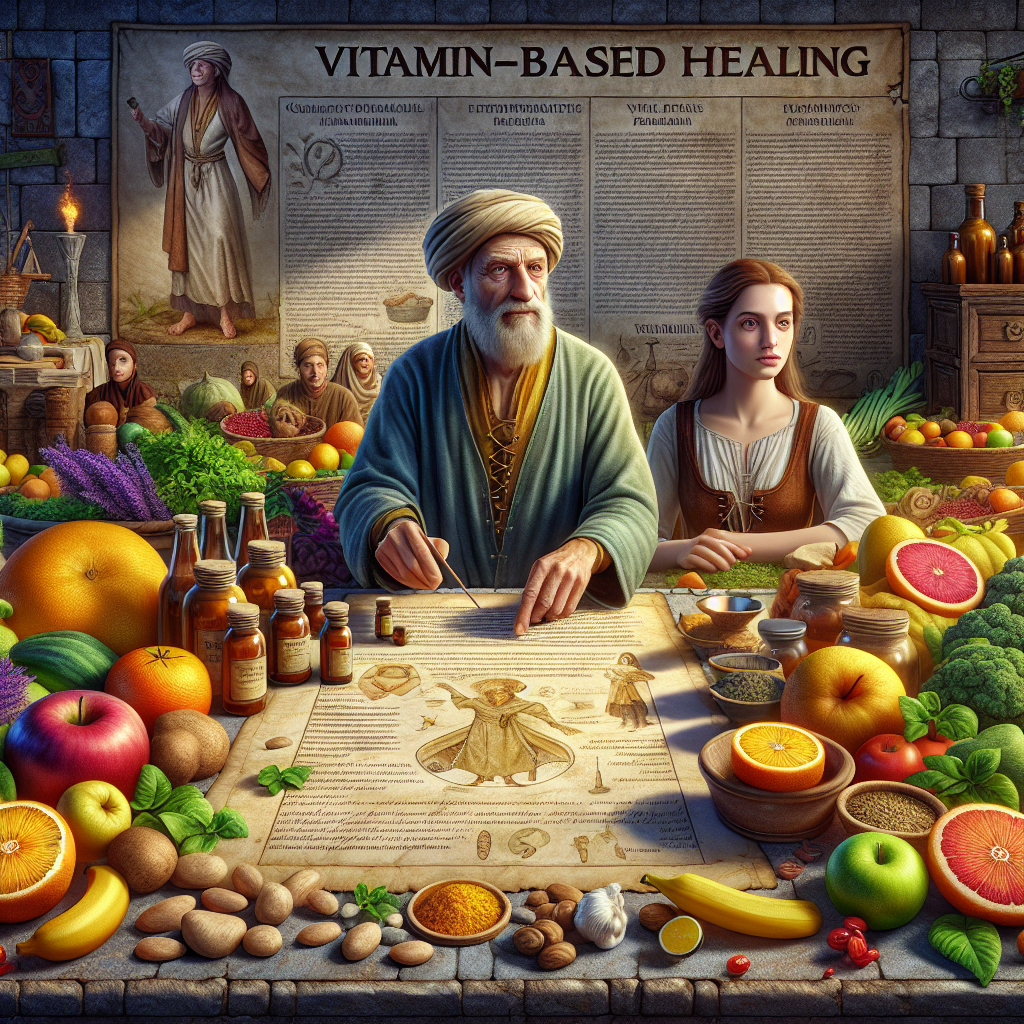Ancient Practices in Vitamin-Based Healing

Discover the secrets of ancient practices in vitamin-based healing! Uncover the wisdom of our ancestors and learn how to incorporate these time-tested methods into your modern lifestyle. Visit www.myvibrantvitality.com today!
Exploring the Role of Vitamins in Ancient Healing Techniques
The ancient world was a treasure trove of knowledge and wisdom, particularly in the realm of health and wellness. Long before the advent of modern medicine, our ancestors had a profound understanding of the human body and the natural remedies that could promote healing and well-being. One such area of ancient wisdom that continues to fascinate us today is the role of vitamins in healing.
Vitamins, as we understand them today, are organic compounds that our bodies need in small quantities for normal growth and development. While the concept of vitamins as we know it did not exist in ancient times, our ancestors had an intuitive understanding of the importance of certain foods and substances in promoting health and warding off disease.
In ancient Egypt, for instance, liver was considered a highly prized food. We now know that liver is rich in vitamin A, which is essential for good vision, a healthy immune system, and cell growth. Similarly, the ancient Greeks recognized the healing properties of citrus fruits, which we now know are high in vitamin C, a powerful antioxidant that can boost the immune system and promote skin health.
In the East, traditional Chinese medicine has long emphasized the importance of balance and harmony in the body. This includes a balanced diet rich in a variety of foods to ensure an adequate intake of all necessary nutrients. Foods like goji berries, known to be high in vitamin A and C, and fermented foods, a source of vitamin B, have been staples in Chinese diets for centuries.
In the Americas, the ancient Mayans were known to use a variety of plants and herbs in their healing practices. Many of these plants, such as the guava and papaya, are rich in vitamins A and C. The Mayans also recognized the importance of sunlight in promoting health and well-being. Today, we know that sunlight is a key source of vitamin D, which is essential for bone health and immune function.
In India, the ancient practice of Ayurveda has long recognized the importance of a balanced diet for health and wellness. Foods rich in vitamins and minerals, such as fruits, vegetables, and whole grains, are central to Ayurvedic dietary recommendations. Ayurveda also emphasizes the importance of certain herbs and spices, many of which are rich in vitamins and other beneficial compounds.
These examples illustrate the remarkable wisdom of our ancestors in recognizing the healing properties of certain foods and substances. While they may not have understood the concept of vitamins as we do today, they intuitively recognized the importance of a balanced diet rich in a variety of foods for promoting health and warding off disease.
Today, as we continue to explore the role of vitamins in health and wellness, we can draw on this ancient wisdom to guide our dietary choices. By incorporating a variety of vitamin-rich foods into our diets, we can support our bodies’ natural healing processes and promote overall well-being.
In conclusion, the ancient practices in vitamin-based healing serve as a testament to the timeless wisdom of our ancestors. Their intuitive understanding of the healing properties of certain foods and substances continues to inform our understanding of health and wellness today. As we continue to explore the role of vitamins in health and wellness, we can draw on this ancient wisdom to guide our dietary choices and promote overall well-being.
The Influence of Vitamin-Based Remedies in Ancient Medicine

The influence of vitamin-based remedies in ancient medicine is a fascinating topic that sheds light on the wisdom of our ancestors and their understanding of the human body. The ancient practices in vitamin-based healing were not only innovative but also remarkably effective, considering the limited scientific knowledge available at the time.
The concept of vitamins as we understand it today did not exist in ancient times. However, the ancients had a profound understanding of the healing properties of certain foods, which we now know to be rich in essential vitamins and minerals. They recognized that certain foods could cure specific ailments, and this knowledge was passed down through generations.
For instance, the ancient Egyptians were known to treat night blindness, a condition we now know is caused by vitamin A deficiency, with liver, which is high in vitamin A. Similarly, the Greeks and Romans used citrus fruits to combat scurvy, a disease caused by vitamin C deficiency. These practices demonstrate an intuitive understanding of the role of vitamins in maintaining health and treating diseases.
In ancient India, the practice of Ayurveda, a holistic healing system that dates back over 3,000 years, also incorporated the use of vitamin-rich foods for healing. Ayurvedic practitioners prescribed a balanced diet, rich in fruits, vegetables, and herbs, to promote overall health and prevent disease. They believed that a balanced diet could provide all the necessary nutrients for the body, a concept that aligns with our modern understanding of vitamins and their role in health.
In China, the ancient practice of Traditional Chinese Medicine (TCM) also recognized the importance of dietary therapy. TCM practitioners used foods rich in certain nutrients to treat various ailments. For example, they used goji berries, rich in vitamin A and C, to boost the immune system and improve vision.
The Native Americans also had a deep understanding of the healing properties of plants. They used a variety of berries, nuts, and roots, rich in vitamins and minerals, to treat various health conditions. For instance, they used rose hips, high in vitamin C, to treat colds and flu.
These ancient practices in vitamin-based healing were not based on scientific understanding as we know it today. However, they were based on centuries of observation, experience, and intuition. The ancients understood the connection between diet and health, and they used this knowledge to develop effective remedies for various health conditions.
Today, we have the advantage of scientific research to understand the role of vitamins in our health. We know that vitamins are essential nutrients that our bodies need in small amounts to function properly. They play crucial roles in various bodily functions, from boosting the immune system to promoting healthy skin and eyes.
Despite our advanced scientific understanding, the wisdom of our ancestors still holds relevance. The ancient practices in vitamin-based healing remind us of the importance of a balanced diet, rich in a variety of fruits, vegetables, and other nutrient-dense foods. They also remind us that nature provides us with an abundance of healing resources, if only we know how to use them.
In conclusion, the influence of vitamin-based remedies in ancient medicine is a testament to the wisdom of our ancestors. Their intuitive understanding of the healing properties of foods has shaped our modern understanding of vitamins and their role in health. As we continue to explore the complexities of the human body and the myriad ways to maintain and restore health, we would do well to remember the lessons from our past.
Unveiling the Secrets of Ancient Vitamin-Based Healing Practices
Unveiling the secrets of ancient vitamin-based healing practices is a fascinating journey into the past, revealing the wisdom of our ancestors and their understanding of the natural world. These practices, which have been passed down through generations, offer a unique perspective on health and wellness that is still relevant today.
The ancient Greeks, for example, were well aware of the healing properties of certain foods. Hippocrates, often referred to as the father of modern medicine, famously said, “Let food be thy medicine and medicine be thy food.” He recognized that a balanced diet rich in vitamins and minerals could prevent and cure many diseases. This belief was not unique to the Greeks. Many ancient civilizations, including the Egyptians, Chinese, and Indians, also understood the importance of nutrition for health and well-being.
In ancient Egypt, for instance, liver was used to treat night blindness, a condition we now know is caused by vitamin A deficiency. Similarly, the Chinese used to consume animal organs, such as the liver and kidneys, to treat various ailments. These organs are rich in vitamins A, B, and C, which are essential for maintaining good health.
In India, the ancient practice of Ayurveda, which dates back over 5,000 years, emphasizes the importance of a balanced diet for maintaining health and preventing disease. Ayurveda identifies six tastes – sweet, sour, salty, bitter, pungent, and astringent – each of which corresponds to different types of nutrients. A balanced diet, according to Ayurveda, should include all six tastes to ensure that the body gets a wide range of vitamins and minerals.
The ancient Romans, too, understood the importance of vitamins for health. They consumed a diet rich in fruits, vegetables, and whole grains, which are high in vitamins and minerals. They also recognized the healing properties of certain foods. For example, they used cabbage, which is rich in vitamin C, to treat wounds and prevent infection.
In the Americas, the indigenous peoples also had a deep understanding of the healing properties of plants and foods. They used herbs and plants rich in vitamins and minerals to treat a variety of ailments. For example, the Native Americans used rose hips, which are high in vitamin C, to treat colds and flu.
These ancient practices in vitamin-based healing reveal a profound understanding of the natural world and the human body. They show that our ancestors recognized the importance of a balanced diet rich in vitamins and minerals for maintaining health and preventing disease. Today, as we face a global health crisis, these ancient practices offer valuable insights into how we can improve our health and well-being.
In conclusion, the secrets of ancient vitamin-based healing practices remind us of the importance of nutrition for health. They show that a balanced diet rich in vitamins and minerals can prevent and cure many diseases. As we continue to explore the wisdom of our ancestors, we can learn valuable lessons about health and wellness that are still relevant today.